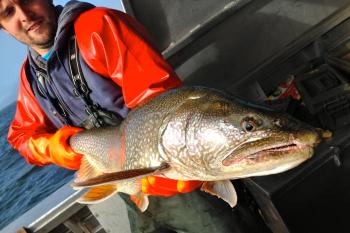On this page:
Objective, Commitments & Measures
Objective:
1.2. Engage communities, with a focus on disadvantaged and other communities with environmental justice concerns, and vulnerable populations, and share information on the risks and benefits of consuming Great Lakes fish, wildlife and harvested plant resources with the people who consume them.
Commitments:
1.2.a. Provide information, including Indigenous Knowledge-based information, regarding the consumption of Great Lakes fish, wildlife and harvested plant resources to Great Lakes communities, with a focus on disadvantaged and other communities with environmental justice concerns.
Measure of Progress:
1.2.1. Risks and benefits of consuming Great Lakes fish, wildlife and harvested plant resources are shared to inform consumption choices.
Background
Since the GLRI began, federal agencies and their state and Tribal partners have worked together to increase the public’s knowledge of Great Lakes fish consumption advisories through innovative and impactful outreach projects across the basin. These projects have targeted vulnerable populations, including subsistence fishers, and provided them with up-to-date advice on the risks and benefits of eating fish caught in the Great Lakes Basin. Over the last several years, GLRI partners have also tackled the challenge of moving away from restrictive-only messaging to a more balanced approach, delivering information on both the risks and benefits of consuming fish. Fish may contain elevated levels of harmful chemicals that lead to consumption advisories, but can provide important nutritional benefits such as omega-3 fatty acids as well.
Under Action Plan IV, GLRI federal agencies and state and Tribal partners will continue implementing projects to enhance the delivery of critical information to the public concerning the risks and benefits of eating Great Lakes fish, wildlife and harvestable plant resources. will be continued focus on enhancing outreach material targeting vulnerable, undeserved, and disadvantaged communities, which includes making consumption advice available in languages spoken in subsistence fisher communities. There will also be continued focus on providing new and updated consumption advice regarding emerging issues such as per- and polyfluoroalkyl substances (PFAS) in fish and wildlife. Partnerships such as the Great Lakes Consortium for Fish Consumption Advisories will continue to play a pivotal role in advancing more cohesive fish consumption advice messaging in the Great Lakes.
Reducing Contaminant Exposures Through Targeted Outreach and Education in Milwaukee, Wisconsin
The Wisconsin Department of Health Services (WDHS) conducted a study in Greater Milwaukee aimed at reducing exposure to persistent environmental contaminants from sportfish consumption among Asian women of childbearing age. WDHS conducted in-depth focus groups with the Chinese, Hmong and Karen communities to understand perceptions on eating fish, fish consumption patterns and advisory awareness, and to identify strategies to increase healthy fish consumption. WDHS tested health messages with community members to identify effective framing that has led to enhanced consumption advice outreach materials and more protective health behaviors.
Continue reading about the Action Plan IV:


